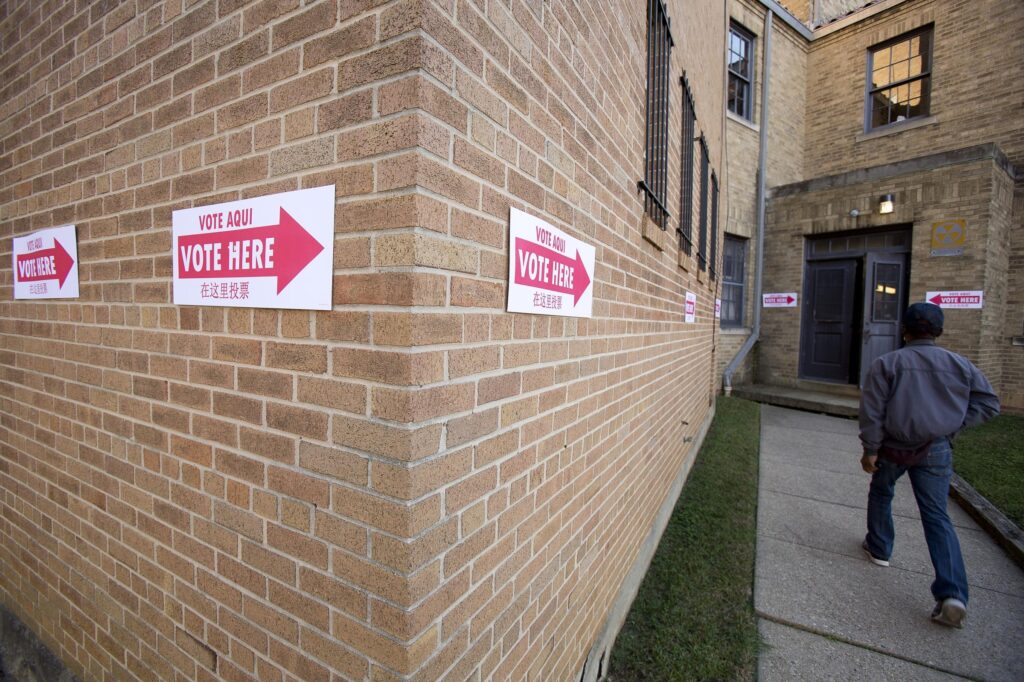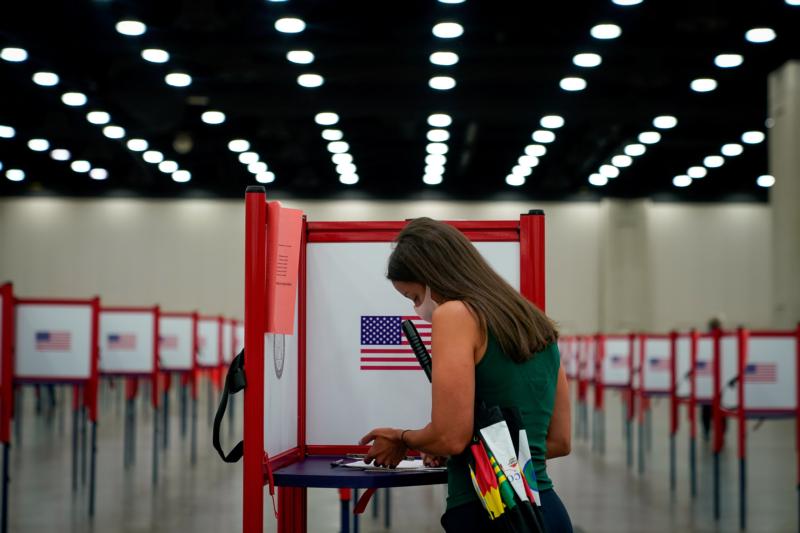
Perhaps at no time since the Civil War has our country been more angry and divided. Indeed, the political landscape is like a bloody battlefield where none of the combatants can hope to emerge unscathed. Caught in the crossfire of ideology and vitriol is the American voter, the average citizen. This includes conscientious Catholic voters who practice their faith, provide for their families and seek to create a more just and charitable society. Unfortunately, in the current, contentious atmosphere, many citizens are afraid even to voice their political views, lest they too become cannon fodder.
While partisan wars rage, however, we, as individual citizens, are obligated to decide for whom we will vote. In reality, we are voting not merely for party platforms, or abstract policies, or ideologies, or for the candidates we like the best or dislike the least. Rather, our votes will have real-life consequences for many people. Thus, we should do our best to discern those consequences. This requires a mature and civil discussion of the issues at stake in any given election. It also requires us to cast our votes in a principled and informed manner.

Fortunately, as Catholics, we can look to our faith for guidance. The first place we might look is the Beatitudes. Here Jesus offers us a self-portrait and, at the same time, a vision of the kingdom of heaven that he brought into the world. In God’s grace, we should strive to be more like Christ, who, out of love for us, was poor in spirit and who still mourns for those in need. We need to keep our eyes fixed on Christ, who was meek before his accusers and righteous in his longing for our holiness, the Christ whose love is single-hearted, the Christ who came to end our enmity with God and one another.
These traits, which Jesus personified and which we can only approximate, do not constitute a voter’s guide, but they should prompt us to do everything possible to ameliorate our bitterly divisive political environment – or at the very least, not to contribute to the rancor. As citizens and believers, we ought to insist that both parties and all candidates tone down their rhetoric, and offer us not acrimony but well-informed and soundly reasoned presentations of issues. We should consistently challenge all public officials, on both sides of the aisle, to govern with the good of the country as their utmost priority, rather than partisan advantage.
Civility, however, as important as it is, does not exempt us from making principled and informed choices. That is why in their document, “Forming Consciences for Faithful Citizenship,” the United States bishops urge us to consider the principles of Catholic social teaching in weighing our electoral choices. I would urge you to read that document in its entirety, but for the sake of convenience, let me offer here a thumbnail sketch of the four guiding principles of Catholic social teaching: human dignity, the common good, subsidiarity and solidarity. We will now briefly look at each of them to see how they might guide our electoral discernment.
The principle of human dignity is the cornerstone of Catholic social teaching. It holds that every person has inviolable, God-given dignity and worth from the moment of conception until natural death. In 1977, former Vice President Hubert Humphrey summarized this principle: “The moral test of government is how that government treats those who are in the dawn of life, the children; those who are in the twilight of life, the elderly; and those who are in the shadows of life, the sick, the needy and the handicapped.”
Let us ask ourselves, who are the most vulnerable members of our society? Who has no one to speak for them but us? How will the stated policies of each candidate play out in their regard? In casting our vote, we need to think first of those who do not have a fighting chance, those who have no voice, those who are utterly vulnerable and defenseless.
Next is the principle of the common good. It asks the question, without forfeiting the human dignity of individuals, what is best for society as a whole? For example, what is necessary to ease the threat of war, to create fair and broad-based economic opportunity, and to protect the environment? What societal conditions will help the most people live a good life and provide opportunities on a just and equitable basis?

Notice, however, that in totalitarian countries, the individual person is subjugated under the state. In such societies, the life and dignity of individuals is often sacrificed for what is portrayed as the common good. By contrast, in Catholic social teaching, human dignity does not take a back seat to the common good. Rather, by promoting the dignity of each person at every stage of life, we are helping to promote the common good of all. Similarly, when the life and dignity of any one group of people in society is undermined, the common good of all is undermined. Moreover, when we pursue the common good without preserving human dignity, we descend into self-interest, that is, we unfairly harm the good of others to advance ourselves.
The common good is not a zero-sum game. Thus, in discerning our vote, we need to move beyond self-interest and reflect on the stated policies of the candidates in light of the common good of society as a whole, while preserving the human dignity of the most vulnerable.
A third principle of Catholic social teaching is subsidiarity. This means that insofar as it is possible and appropriate, problems are to be addressed and initiatives for the good are to be undertaken at the most local level. In other words, human dignity and the common good advance when the diverse peoples of our society have an appropriate degree of autonomy and participate in decision-making.
Federal and state government, and other large institutions, must continually help those who are struggling and must seek to create equitable conditions for all. However, large institutions do not have all the answers or the necessary resources. Rather, families and community-based groups must work together at the local level for human betterment.
Families are foundational; it is where young people discover their dignity and are formed in virtue. The family is the primary place where young people are educated for healthy and productive lives. Churches play an important role in this, but churches must also have the freedom to follow their teachings in offering educational, healthcare and social services, not only to their members but also to the wider society.
The principle of subsidiarity also prompts us to focus on the importance of the election of local officials who serve more directly our state, counties, cities and neighborhoods. In discerning our vote, we need to ponder which candidates are likely to respect the principle of subsidiarity, especially by fostering family life and the role of churches and community-based groups.
Solidarity is the fourth pillar of Catholic social teaching. This is a recognition that those who differ from ourselves – by race, language or culture – are in fact our brothers and sisters. We are bound together by a common humanity and by equal dignity, as also by a common call to friendship with God.

The principle of solidarity calls us to have a special love for the unborn as well as for those who are poor, vulnerable or oppressed, and those who are victims of racism, prejudice, brutality or deprivation of life’s necessities, both at home and abroad. This includes those who have arrived recently on our shores and who are trying to create a better life for themselves and their families. It also includes fellow Christians who are suffering severe persecution in parts of the Middle East and Africa.
One of today’s challenges is maintaining legitimate diversity while maintaining a sense of our common humanity. Perhaps if we gave more attention to the principle of solidarity, we would find it possible to inject politics with more humanity, and place it more squarely at the service of the citizenry. Conversely, neglecting solidarity means risking that our country will continue to be pulled apart and fractured, perhaps beyond repair. We therefore need to take personal responsibility for promoting solidarity by respecting those with whom we might disagree. And, in discerning our vote, we need to ask which candidates and which policies would best foster authentic human solidarity, in our land and beyond our shores.
Finally, I would urge you as fellow citizens and Catholics, to vote. Casting our votes is not only a privilege but also a solemn duty and responsibility. Many have fought and even shed their blood to defend this right. Let us ask the Holy Spirit to guide us but let us also remember that our civic duty does not end with voting. Rather, it begins anew the moment we have cast our vote.
For Maryland congressional candidates’ responses to a survey by the Maryland Catholic Conference, visit mdcathcon.org/elections.
Copyright © 2020 Catholic Review Media


